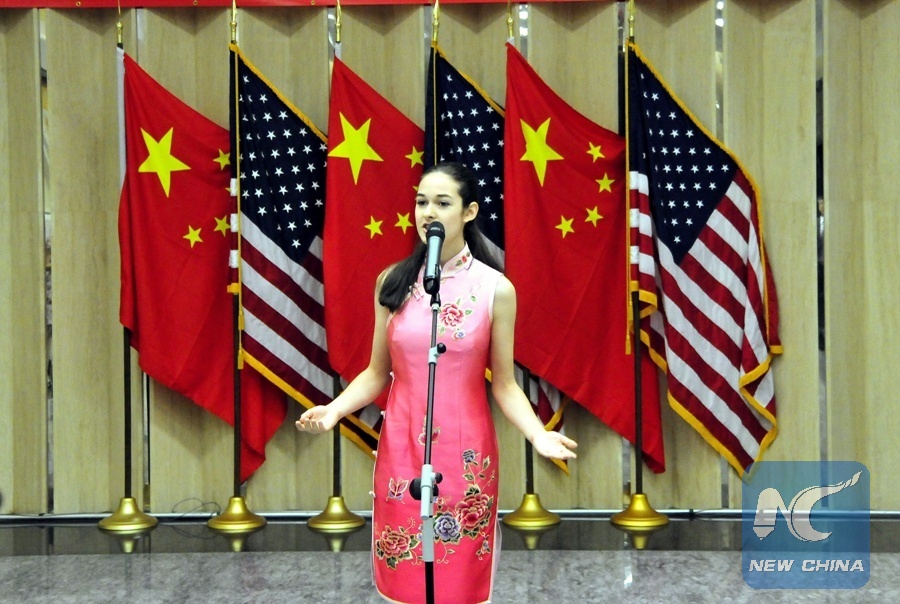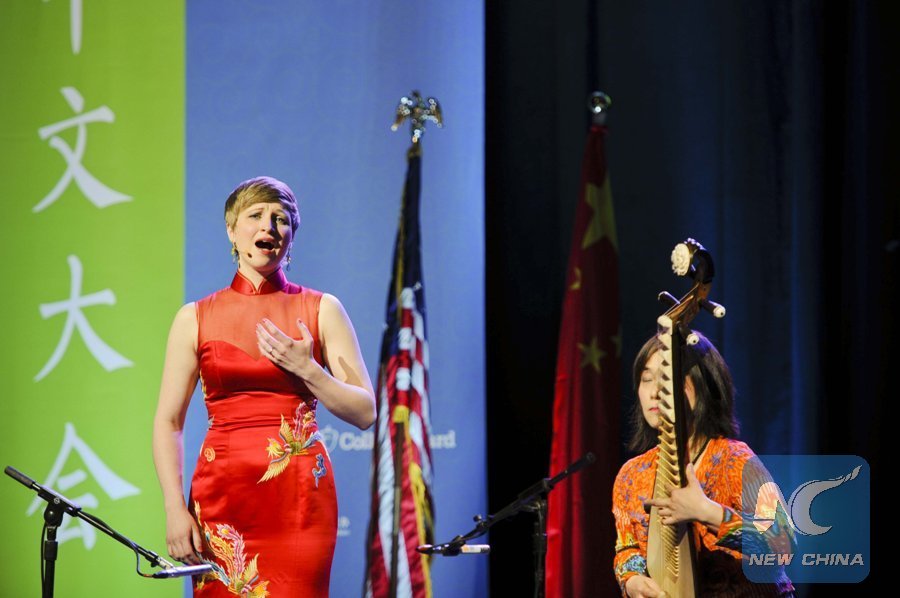
A competitor performs Chinese calligraphy during the preliminary contest of the 10th Chinese Bridge language proficiency competition for the midwest of the United States at the Confucius Institute of Purdue University, West Lafayette, Indiana, the United States, April 23, 2011. Over 30 competitors from 11 Confucius Institutes took part in the competition Saturday. (Xinhua/Jiang Xintong)
by Xinhua writers Yang Shilong, Zhang Zhihuan
NEW YORK, July 17 (Xinhua) -- Arabella and Joseph Kushner, grandchildren of U.S. President Donald Trump, endeared themselves to Chinese-speaking communities in early April when they performed a traditional folk song "Jasmine" in Mandarin for Chinese President Xi Jinping during the two leaders' first meeting in Florida.
The two young members of the U.S. first family are joining a growing list of American celebrities including Facebook co-founder Mark Zuckerberg and Malia Obama, former President Barack Obama's daughter who take Chinese as their second language.
The followers of the world's oldest written language are not confined to key public figures. U.S. statistics show Chinese is the third most popular language in the country, only behind English, official language, and Spanish.
Why are Americans so enthusiastic about Chinese?
Each one might have a different story but all of our interviewees agree that Chinese, against the backdrop of the breathtaking scale and development of China, is becoming an increasingly useful asset for their personal and professional growth in the future, not least gaining a better understanding of one of the richest cultures in the world.

A student performs during the preliminary contest of the Chinese Language Bridge Competition at San Francisco State University in San Francisco, the United States, April 2, 2011. (Xinhua/Liu Yilin)
"I WOULDN'T BE THE PERSON I AM TODAY WITHOUT LEARNING MANDARIN"
"When I chose Chinese, I just thought I don't know much about China and this will be an opportunity for me to learn something and I'm very glad that I did," Aisling McCaffrey told Xinhua recently at the New York-based China Institute, the oldest educational institution devoted solely to Chinese culture in the United States.
McCaffrey started learning Chinese when she was in her first year majoring in international business at the Carleton University, Ottawa, Canada. After graduation, she went to the Renmin University in Beijing, China, for further studies.
"I think everyone believes that China will be the next great superpower ...even if it's not a superpower like America. It's still very significant," she said. "And learning Chinese is the best way to make sure that you can be part of that growth."
"And you know for us in North America, we need China's help for our economy to grow, you need our help for your economy to grow. So I think a lot of us are interested in facilitating that growth on both sides through communication, and Mandarin is a very important language for that."
McCaffrey has recently relocated to New York City with her boyfriend after working a few years at the Canadian Chamber of Commerce in Shanghai, China. She comes to the monthly Mandarin meet-up at the China Institute while searching the next step in her career.
"I get to practise my Chinese...I would like to take more lessons because if I don't speak Chinese, I can already feel myself losing it and I really don't want to forget it because I spent many years working on it," she said.
"To be honest, the fact that I didn't know much about China before and then I developed this love for China, I spent most of my adult life living in China, which has really influenced my life. I wouldn't be the person I am today without learning Mandarin," she said.
McCaffrey said learning Chinese was the first step to know China and its culture.
"If you want to learn a culture you should learn the language, because how are you gonna to talk to the people and know what they are doing if you can't talk to them?" McCaffrey said.
"I realize that for some people politics are very very important and I respect their views, but at the same time they don't know what Chinese people are like, they've never talked to the people and I think that they could take the opportunity to go to China and see what it's really like because it is a wonderful place," she added.

Marisa Salatino from The Hockaday School performs during the "Chinese Bridge" Southern American College and Middle School Students Chinese Language Contest in Houston, the United States, April 24, 2011. (Xinhua/Chen Ruwei)
"I JUST WONDER WHEN I CAN PICK OUT EVEN ONE (CHINESE) WORD"
Mary Hoffman, a middle-age teacher from Brooklyn, the most populous borough of New York City, is equipping herself with Chinese for a better understanding and communication with a growing number of Chinese students and their parents in her neighborhood.
"There are so many Chinese students now, to overhear the conversation on the subway and I just wonder when I can pick out even one word, like I know the word 'pengyou,' I think it's 'friend.' If I can pick up that when I have a conversation with the parent, there always has to be an interpreter present, but if I can pick up one word in what the interpreter is saying, I would be just like, wow, I understand that."
According to a report published by U.S. Immigration and Customs Enforcement in May 2016, there were some 353,000 Chinese students studying in the U.S., accounting for 34 percent of the total number of international students in the country.
"If you learn another language, it's like that it gives you a slightly different perspective on things," said Hoffman, adding she also wants to learn Chinese to explore the fascinating culture manifested by Chinese students.
"I just was struck how hard the (Chinese) students work, and that cultural piece of working hard and being humble, we see a lot of that in the Chinese immigrant communities, so it's interesting to know where it comes from,"she said.
"And also the (Chinese) family structure seems to be very strong, because you'll see a young people walking with an older person, and holding their hands and helping them. You don't really see that with the American families. So that's been really noticeable," she added.
Like McCaffrey, Hoffman also attributed the growing popularity of Chinese in the U.S. to China's growing influence in global affairs.
"A lot more high schools are offering it (Chinese) now, so I think it's a combination of factors, the impact of the culture has become more stronger as it's become more prosperous," she said.
Current figures reveal that over 200,000 students are actively studying Mandarin in the U.S. presently, with more expected to follow. The U.S.-China Strong Foundation said it aims to expand to 1 million the number of U.S. K-12 students learning Mandarin by 2020.

A student takes part in the calligraphy competition of the 9th Chinese Language Bridge Cup Contest in San Francisco, the United States, Mar. 3, 2013. Held by the Confucius Institute of San Francisco State University and San Francisco's Unified School District, the contest kicked off on Saturday with the participation of some 1,400 student. (Xinhua/Liu Yilin)
"I'D LIKE TO BE ABLE TO COMMUNICATE A LITTLE BIT BETTER (WITH MY ADOPTED DAUGHTER)"
For Patrick Gunn, Chinese is a language of love. The general manager of a local asset management company and his wife adopted a one-year-old girl from Guilin, Guangxi Province of China in 2006. In order to keep her Chinese heritage, the couple raised the girl with her mother tongue by going to a bilingual school.
"It's hard for me to communicate in the language with her, particularly because her language skills have got very good, she makes fun of me when I try to pronounce things in Chinese and tells me that I'm saying nothing," Gunn smiled.
"I'd like to know more about the culture, more about the language. I'd like to be able to communicate a little bit better," he said. "We are making a trip in about three weeks, we are going back and visit some cities in China, and I'd like to be able to communicate with some people along the way."

Artists perform during the opening ceremony of 2016 National Chinese Language Conference in Chicago, the United States on April 28, 2016. The meeting has become the largest annual gathering in the country of teachers, administrators, and policymakers engaged in the teaching of Chinese language and culture.(Xinhua/He Xianfeng)
"IT'S A NEW THING THAT AMERICANS LEARN CHINESE FOR JOBS IN CHINA"
Chen Jinguo, who immigrated to the U.S. in early 1990s, has taught many adoptive parents like Gunn in his nearly 20-year teaching at the China Institute.
"These parents often turn out to be very dedicated Chinese learners, Gunn's words are so sweet and moving," Chen said.
The 50-year-odd man said he feels great to see more and more Americans come and learn his native language.
"There was an English fever in China when I left for the U.S. Now we are seeing a Chinese Fever here," he said. "Moreover, many of my students study Chinese for jobs in Chinese major cities including Shanghai, Shenzhen and Beijing, that is something I have never seen before."
Actually, Chinese has been becoming a language of business and tourism, Chen noted. There are more and more American businesses not only having their products made in China, but also marketing towards the expanding market of the Asian power.
China is one of the fastest growing international market for New York City as nearly 1 million Chinese visited the Big Apple in 2016, according to NYC & Company, the city's tourism marketer.
Businesses across the city, including hotels, cultural institutions and restaurants, are turning to Chinese travellers, many of them have started offering Chinese language tours, and hot tea, slippers and other amenities.
"Chinese tourists are big spenders and they also help fan up the Chinese Fever here," Chen said.

